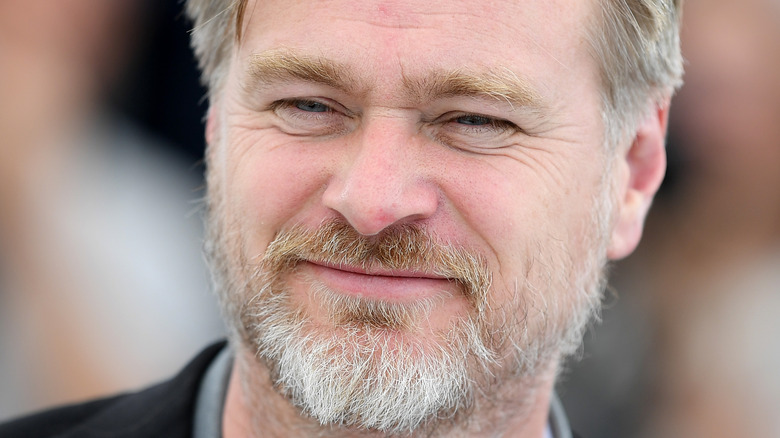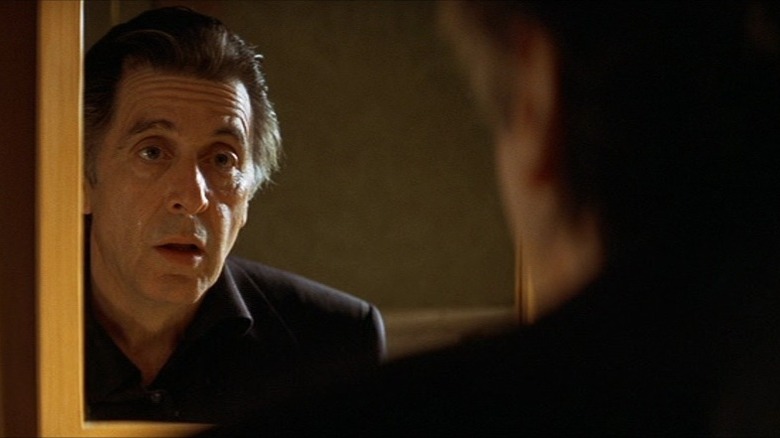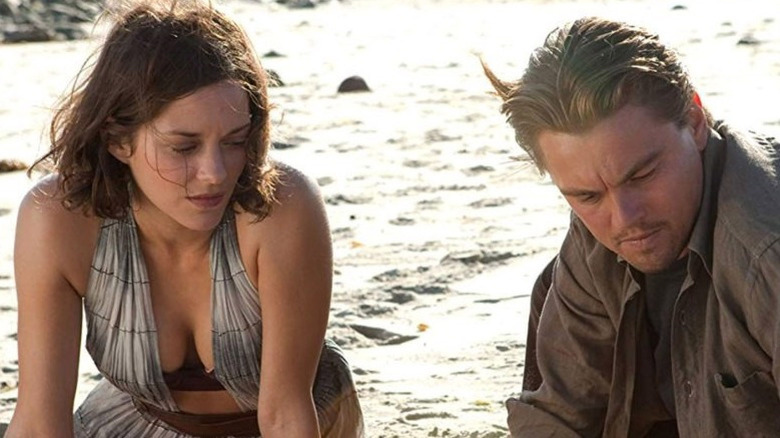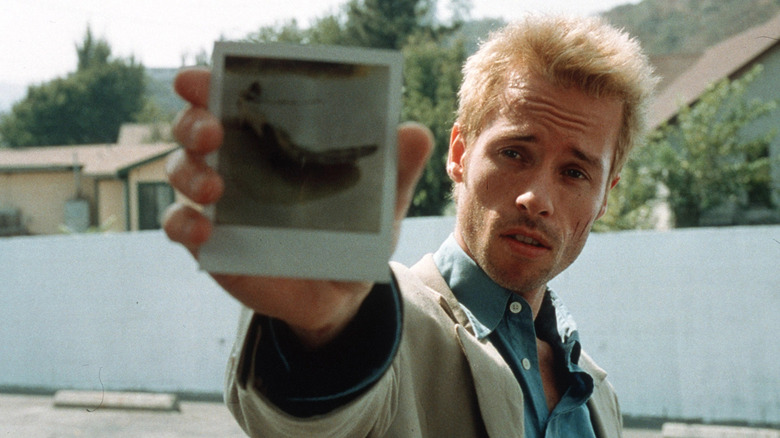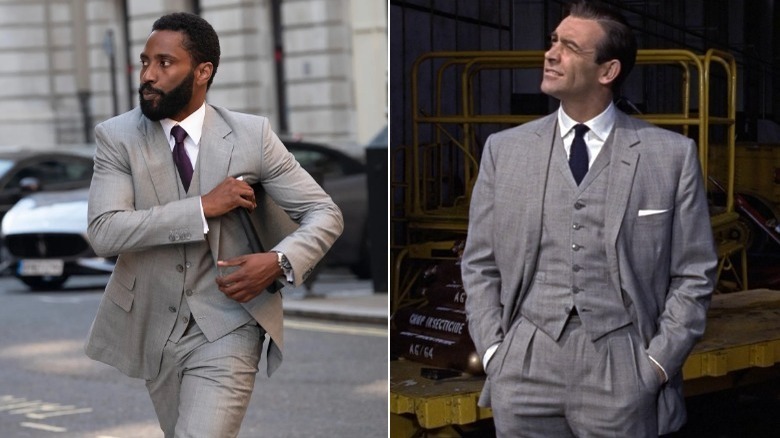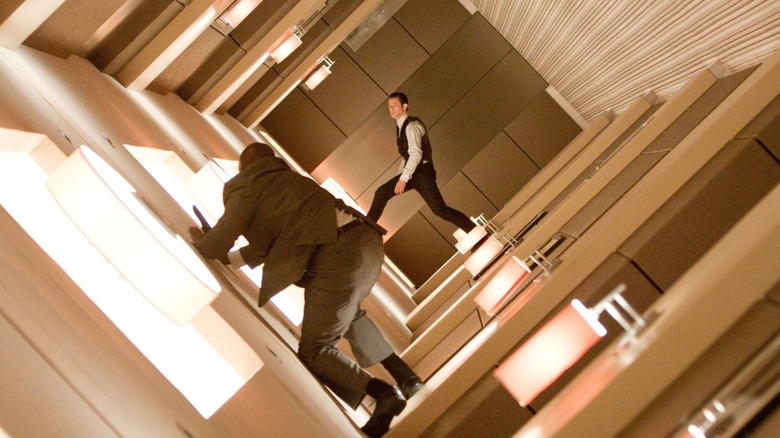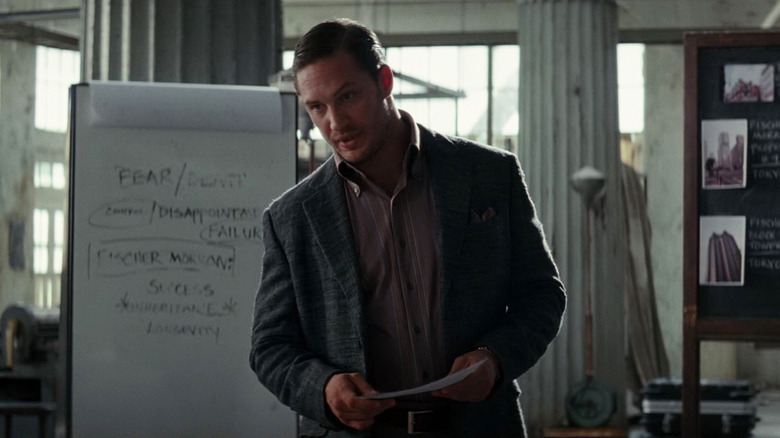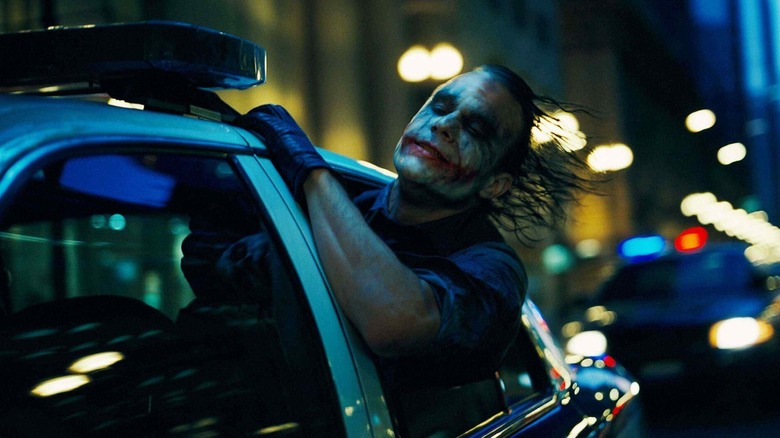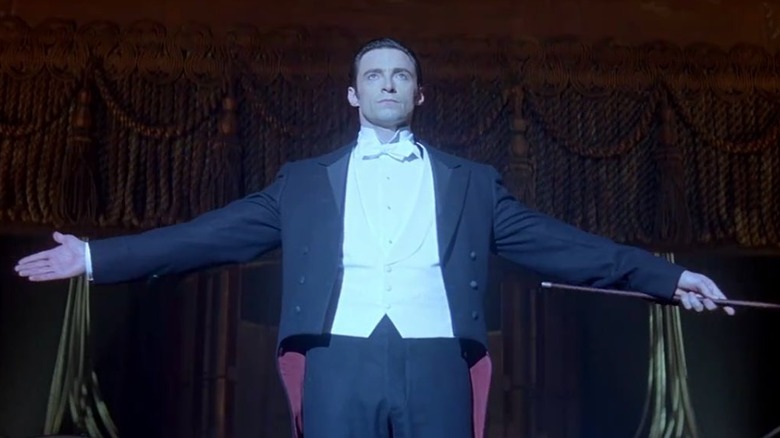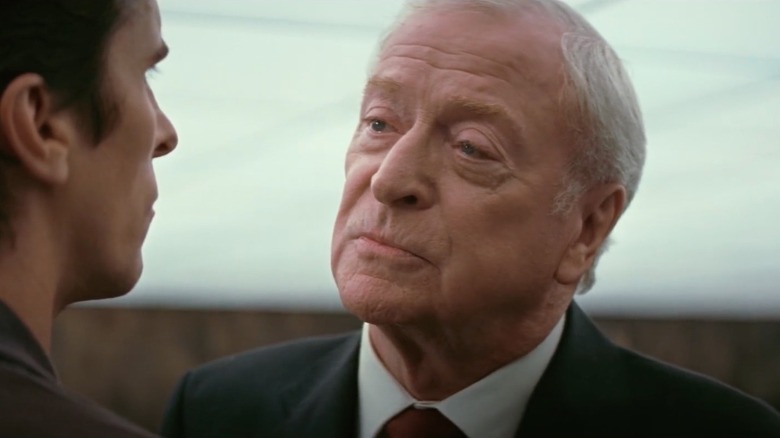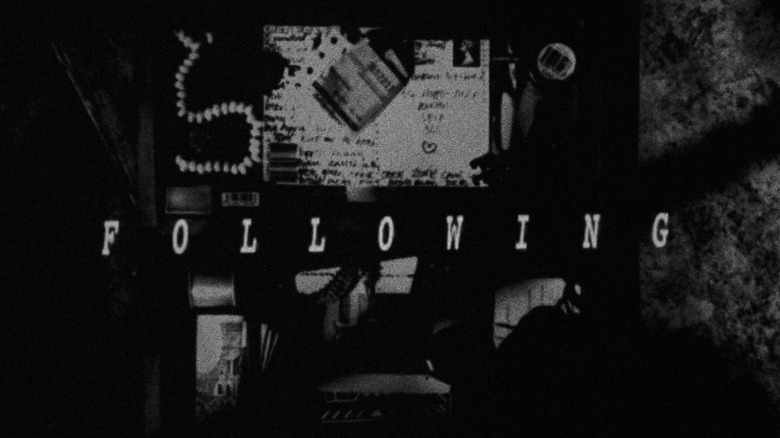Things That Happen In Every Christopher Nolan Movie
There's no other director quite like Christopher Nolan. After first breaking out into the mainstream with his 2000 independent film "Memento," he's since grown into a somewhat unique presence in Hollywood: a filmmaker who writes and directs his own original brainy action blockbusters, most of which are not based on any pre-existing intellectual property. And since pretty much all of Nolan's films have been massive successes, his budgets have only been growing, and now he seems like he's in a position where he can make pretty much whatever wild high-concept movies he wants without anyone asking too many questions.
Though his films are all quite different from one another, they're all still undeniably "Nolan-esque," with similar themes, characters, and storytelling techniques that pop up over and over again. But what is Nolan-esque? We've looked over all 11 entries in his filmography, and we're ready to present our findings. Here are the things that happen in every Christopher Nolan movie.
Obsessive protagonists
There's a certain type of protagonist who appears over and over again in Christopher Nolan's filmography. He is a man endlessly chasing an unattainable goal. In "The Prestige," magician Robert Angier is obsessed with proving his superiority over his rival, Alfred Borden. In "Inception," Cobb will do anything to return to his family in the United States. In Nolan's Batman films, Bruce Wayne is consumed by his desire to defeat organized crime in Gotham City.
In order to achieve this goal, this man trains to be the perfect version of himself, in both body and mind. Leonard Shelby in "Memento" meticulously creates what he believes to be a perfect system to master his memory condition and find his wife's killer; the lead in "Following" learns to be a thief and con artist due to his increasing obsession with voyeurism; and the protagonist of "Tenet" studies negative entropy to do things he once thought were impossible.
Even when our hero achieves his goals, he has to sacrifice everything else to get it. In "Interstellar," Cooper travels to the stars to save his children but ends up missing out on their entire adult lives. In "Insomnia," Will Dormer's need to arrest criminals leads to him planting evidence, selling out on all his moral principles for what he believes is the greater good. All three of the plotlines in "Dunkirk" end with at least some element of tragedy, as multiple characters who dedicate themselves to saving others fail to save themselves. In the end, our obsessive hero must ask himself, "Was it worth it?"
Dead wives
If you look at the romantic partners of Christopher Nolan's various heroes, you may notice a trend: for the most part, they're not around anymore. Not one of Nolan's protagonists is ever shown in a stable, happy relationship. Some of them are single, and the rest are all widowed, haunted by the ghost of their lost love.
The protagonists of "Memento" and "Interstellar" both have dead wives, and in "The Prestige," one of the lead's wives dies midway through the story. In "Inception," the ghost of lost love that haunts our hero is a bit more literal since whenever Cobb enters a dream world, an imagined version of his late wife Mal shows up to torment him. At first, Nolan's "Batman" films seem like they are going to subvert this trend. The deaths haunting Bruce are the deaths of his parents, whereas his love interest, Rachel Dawes, is alive and well. However, by the end of the second film, Nolan once again kills off our hero's prospective paramour.
It's easy to see why Nolan keeps returning to this particular trope — his films tend to be about people losing everything due to their obsessions. What better way to demonstrate this than by having them lose the love of their life? On top of that, there's usually so much going on in Nolan's films that there isn't much time to spend fleshing out our protagonist with a complex backstory or romantic subplot. A dead wife is a quick shortcut to establishing a sympathetic protagonist. Then again, it would also be nice to see Nolan mix things up a bit more. Why not give one of these haunted heroes an estranged ex-wife who's still alive? Or a dead husband?
Achronological storytelling
Christopher Nolan is a filmmaker who seems obsessed with time. In some of these stories, time is literally being distorted in some way due to science fiction technology. "Tenet" features a technology that can reverse the direction that an object travels in time. In "Inception," there is simultaneous action occurring across multiple different realities in which time is flowing at different speeds. Time dilation from high-speed space travel is a major plot point in "Interstellar," and in the climax, our protagonist is pulled into a black hole and finds that he now exists outside of normal space and time.
Even in cases where the film isn't about actual time travel, Nolan still frequently presents his stories out of order. The most obvious example of this is "Memento." The film is about a man who is unable to form new memories, so the film presents its scenes in reverse chronological order to simulate how the protagonist experiences reality. "The Prestige," "Batman Begins," and "Inception" all start in the middle and then jump back to fill in the backstory. Elsewhere, "Dunkirk" cuts back and forth across three different storylines throughout its runtime: one takes place over the course of a week, one takes place over the course of a day, and one takes place over the course of an hour. In a way, it's pulling the same trick that "Inception" did, with simultaneous action where time flows at different speeds in different storylines. But this time, it isn't literal — it's just in the way the story is edited together.
Borrowing from Bond
It's no secret that Christopher Nolan loves James Bond. He's stated in multiple interviews over the years that Bond films are a major influence on him and that someday, he'd love to direct one. Once you know this about him, so much about him as a writer and director suddenly snaps into focus, as many of Nolan's films are basically James Bond movies with the serial numbers filed off.
His heroes are often highly competent men in well-tailored suits. Whatever emotions they may have, they're buried deep because they're too busy driving cars and fighting bad guys. Nolan's "Batman" trilogy features a very James Bond-esque Bruce Wayne, "Tenet" is a Bond movie with time travel, and "Inception" is a Bond movie about dreams.
On the topic of "Inception," when that film first came out, some critics felt a bit underwhelmed by how the movie presented its dream worlds, asserting that Nolan's portrayal of dreams wasn't imaginative enough. Compared to other films about dreams, such as "The Science of Sleep," "The Cell," or "Paprika," "Inception" is relatively grounded. There are no rainbow dragons or donuts raining from the sky — it's all just stylish dudes shooting at each other with guns. But once you understand just how profoundly this man loves cool superspy action, it's no longer puzzling why he made the film in this manner and why he was uninterested in pushing things into more surreal territory. A movie about dreams could be a movie about anything, so Nolan used this opportunity to make his ultimate dream come true.
A preference for practical effects
In an era when films of all genres are becoming increasingly reliant on CGI, one thing that separates Nolan from many of his contemporaries is his strong preference for using practical effects whenever possible. Many of the most unforgettable, seemingly impossible visuals in Nolan's films are made with old-school filmmaking techniques, and just an occasional sprinkle of computer trickery.
In "Inception," the fight that takes place in the hotel hallway with ever-shifting gravity was made by creating an entire set that can rotate around a full 360 degrees. In "The Dark Knight," the massive truck that flips end over end was an actual truck that actually flipped end over end, and similarly, the hospital that the Joker blows up was an actual abandoned building. In "Tenet," much of the backward action was made just by filming something normally and playing the footage backward, one of the oldest special effects tricks in the book.
All told, most Nolan films only feature around 500-800 visual effects shots. That may sound like a lot, but most other sci-fi blockbusters have somewhere in the neighborhood of 1,500 to 2,000 VFX shots (per Wired). "Tenet" is even more sparing, with less than 200 VFX shots. In an interview with ICG Magazine, Nolan claims that this number of VFX shots is "probably lower than most romantic comedies."
Infodumps
Presenting complex information to the audience in interesting ways is one of the most difficult challenges in science fiction filmmaking. The most direct way of doing is just to have one character explain this information to another, a technique known as the "infodump." This approach is usually much maligned by film fans, and yet Christopher Nolan uses them constantly. They're still a bit clunky, even when Nolan does them, but there are also two reasons why Nolan's infodumps are a bit more palatable than most.
First, when Nolan feels the need to include a scene in which two characters talk about made-up nonsense, you can be assured that the characters will be stylish and attractive, the dialogue will be witty, and the shots will be well-composed and well-lit. Second, Nolan's movies are often built around complex science fiction concepts, and the most efficient way to teach the audience about these concepts is just to have someone explain them. Yes, a movie like "Inception" is mostly just talking for the first half, but all that exists to prepare you for the back half of the film, which is nonstop sci-fi action that plays with and subverts all the rules the film has just taught you.
Some still assert that this technique is still flawed, and that's a totally valid perspective. But while infodumps might not be the best way for Christopher Nolan to accomplish his goals, they still do get the job done.
The score will innovate and experiment
Perhaps the one aspect of Christopher Nolan's filmmaking that might just be the most innovative of all lies in the highly unusual soundtracks. Nolan has a strong vision for unconventional soundtracks that reflect his film's deeper themes, and to that end, he is known for pushing his composers to experiment and reach beyond their normal limits.
His most obviously avant-garde soundtrack is probably the one for "Inception," composed by his most frequent musical collaborator: Hans Zimmer. The soundtrack utilizes sections of Édith Piaf's "Non, je ne regrette rien" played at different tempos and distorted to varying degrees all throughout the film. The film is also often credited with popularizing that deep booming "BRAAAM sound," which would go on to become the defining sound of blockbuster film soundtracks and movie trailers throughout the 2010s.
But "Inception" is not the only Nolan film soundtrack that is based around big, weird ideas. When working on "Dunkirk," Nolan told Zimmer to keep things as minimal as possible, saying, "I don't want any emotion in the music." He also requested that the film use an antique ticking pocket watch as a core element of its sound design. At the opposite end of the spectrum, Zimmer's soundtrack to "Interstellar" seems to be an exercise in purposeful excess, bombarding the audience with a wall of overpowering synthesizers, strings, and pipe organs throughout all its most emotionally intense sequences.
All this being said, Nolan's high standard and need to push boundaries also sometimes leads to him butting heads with his various composer collaborators. Nolan said of his collaboration with Zimmer in an interview with Classic FM, "We fight like cats and dogs but in the best, the most productive way."
The story will deceive you
Most of Christopher Nolan's films are explorations of deception, both in terms of their subject matter and in how their stories are presented. The extractors in "Inception," the dueling magicians in "The Prestige," and our dirty detective lead in "Insomnia" are all professional liars in one form or another. For Nolan's version of "Batman," Bane suggests that his most powerful weapon is "theatricality and deception." Structurally, most of these films also function as a sort of con — or, if you prefer, a magic trick, since the audience is a willing participant in this particular scam. You think you're in one type of story until the final act reveals a great and terrible truth that changes everything.
In "Memento," we think Leonard is our hero, hot on the trail of his wife's killer, until we — and he — learn some upsetting news about his forgotten past. In "The Prestige," the ultimate reveals about how both pairs of magicians pulled off their respective "transported man" tricks in different ways is a descent into some deeply upsetting and mind-bending territory. After seemingly concluding on a happy note, in its final moments, "Inception" makes us consider the possibility that what we're seeing might not be real at all before finally cutting to black.
When Nolan ends a film, you simultaneously feel like you didn't see it coming at all, and it couldn't have ended any other way. And just like a good magic trick, you can't always be sure exactly how he pulled it off.
It won't pass the Bechdel test
Despite everything that's great about his films, Christopher Nolan also seems to have a fairly limited range when it comes to the sorts of stories that he's interested in telling. Simply put: Nolan makes movies about men. Across 11 films, all his protagonists have been men, and the vast majority of his supporting characters have been men. As such, as far as we can tell, not a single one of Nolan's films fully and unequivocally passes the Bechdel test.
If you are unfamiliar with the Bechdel test, it was taken from a 1985 comic strip by cartoonist Alison Bechdel, in which a character asserts that she is only willing to see a movie if it satisfies the following requirements: it must have at least two women in it who talk to each other about something other than a man. Though the test was originally intended as just a joke, the Bechdel test has caught on as a useful shorthand for discussing how well a film portrays its female characters, presumably because of how small of an ask it is. One would think it would be trivially easy for most films to pass this simple test of having two women talk to each other, but nearly all older films fail the test, and even modern films only pass it around 64 percent of the time (via Datawrapper).
The Bechdel test is still best deployed as a bit of fun satire, a way to poke fun at the limited imagination of some male writers, rather than being any sort of definitive "is this movie feminist" test. That being said, if every single entry in a director's extensive filmography fails to meet even this most basic and perfunctory of tests, eventually, one begins to question why.
Michael Caine will be there
Like many filmmakers, Christopher Nolan has developed a stable of favorite actors that he is fond of reusing across multiple films. Ken Watanabe, Marion Cotillard, Anne Hathaway, and Joseph Gordan-Levitt have all appeared twice. Tom Hardy and Morgan Freeman have shown up in three films, Christian Bale has appeared in four, and Cillian Murphy has shown up in six. But all of this pales in comparison to Nolan's number one most recurring actor: Michael Caine.
He doesn't appear in Nolan's first three films, but ever since he was cast as Alfred Pennyworth in "Batman Begins," Michael Caine has shown up in every subsequent Christopher Nolan movie in some capacity. He's John Cutter in "The Prestige," Professor Stephen Miles in "Inception," Professor Brand in "Interstellar," Sir Michael Crosby in "Tenet," and he has a small voice role in "Dunkirk." That means that out of 11 films, Caine has appeared in 8 of them!
It's a decision that's worked out well for Nolan. All his films that feature Michael Caine have been commercially and critically successful, so it seems that Nolan might be a little superstitious about breaking this particular trend. Reflecting on his small role in "Dunkirk" in an interview with Variety, Michael Caine said, "I'm in his movies now as a good luck charm. ... There was no part for me, but I was the officer who answered all the airplanes and gave them instructions what to bomb." We're not complaining. As long as Nolan keeps casting Michael Caine in his movies, we'll keep watching them.
The title will (probably) be one word
Another fun trend among Christopher Nolan films is that, for the most part, they tend to have titles that are just one word. "Following," "Memento," "Insomnia," "Inception," "Interstellar," "Dunkirk," and "Tenet" all have one word names (and three of them even start with "In").
There are only a couple of exceptions to Nolan's one-word rule. One is "The Prestige." Then again, most video stores would file the DVD box under the "P" rather than "T," so there's still some ambiguity as to whether or not "the" counts as a full word in this context.
The other big exceptions are Nolan's "Batman" films, and this is totally understandable. The only real way to make a movie about Batman that would have a one-word title would be to make a movie just called "Batman," and Tim Burton already did that back in '89. Trying to make a whole trilogy of Batman films with one-word titles would be a nigh-impossible. Then again, releasing a trilogy of Batman films just called something like "Begins," "Dark," and "Rises" would have been one heck of a power move.
